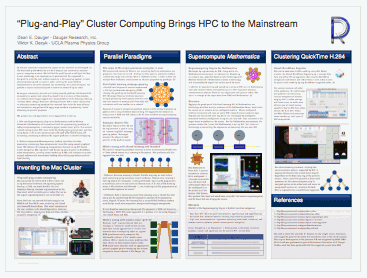|
Abstract:
To achieve accessible computational power for our research goals, we developed,
on the Macintosh platform, the tools to build easy-to-use numerically-intensive
parallel computing clusters. We find that the usability and reliability of the
Mac cluster technology is as important as its performance. Our approach is
designed to allow the user, without expertise in the operating system, to most
efficiently develop and run parallel code, enabling the most effective
advancement of scientific research. By
"reinventing" the cluster computer, we
provide a unique solution designed to maximize accessibility for users.
To support numerically-intensive and tightly-coupled problems that demand the
computational power and networking capabilities of clusters of Macintoshes, our
software technology supports five implementations of the Message-Passing
Interface (MPI), today a dominant industry standard. MPI's status implies how
its underlying computing paradigm
has revealed itself to be the most efficient
and economical way yet found to apply large numbers of processing "cores"
effectively for general purposes.
We present two new applications of our approach to clustering:
1. The new Supercomputing Engine for Mathematica enables Wolfram Research's
Mathematica to be combined with the programming paradigm of today's
supercomputers. In contrast to typical master-slave "grid"s, this solution
instead closely follows MPI, from inside the Mathematica environment, and has
every kernel in the cluster communicate with each other directly and
collectively, necessary to address the largest problems in scientific
computing.
2. Modern compression/decompression (codec) algorithms for video processing
increasingly have compression times that vastly exceed playback times.
We
address this emerging computational demand using MPI-based cluster computing.
We implement load-balancing parallelization of QuickTime video compression,
including frame-reordering H.264, and interface our cluster support software
with mainstream desktop video-editing applications such as Final Cut Pro.
| 


